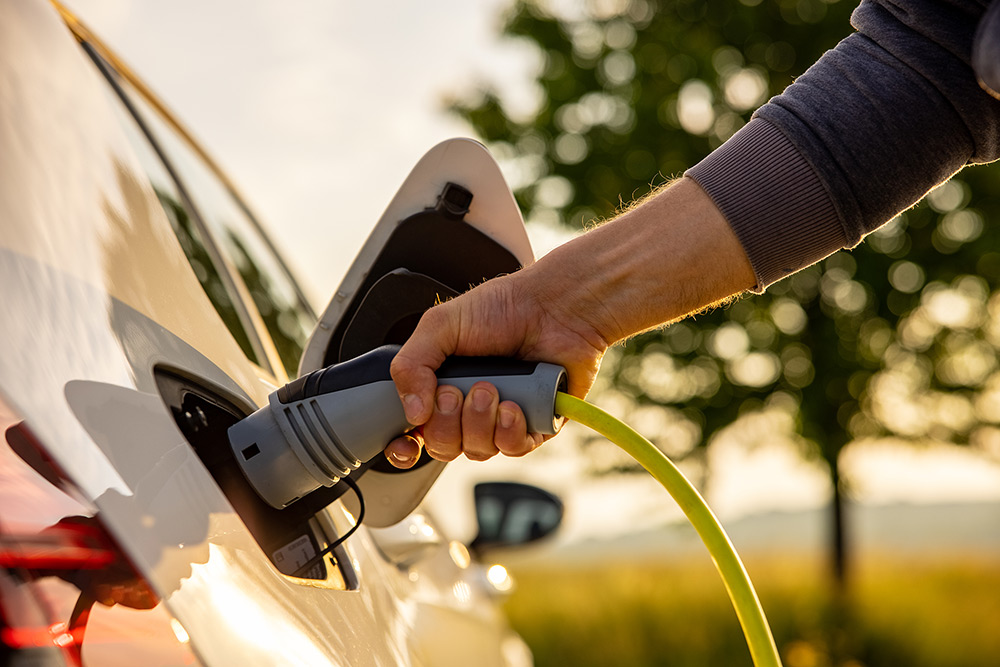How to save on charging your EV with home solar
Recharging your electric vehicle (EV) with a home solar system can significantly cut your energy costs.

Home solar system owners can use the energy generated by solar panels to charge their EV during daylight hours. This reduces reliance on grid electricity and lowers overall energy expenses.
It is also worth considering a time-of-use (ToU) tariff from your energy provider to further optimise costs.
This tariff incentivises users to shift some of their power usage, including EV charging, to non-peak times when power is cheaper. Higher usage charges apply during peak times.
Charging from the grid during a non-peak period, such as overnight, is a cost-effective option for EV owners when they can’t use solar power.
EV charging levels explained
EV owners can choose between two options, or levels, when charging at home.
Level 1 charging uses a standard household power outlet, offering convenience but slower charging times.
It is useful for topping up plug-in hybrids (PHEV), which have smaller batteries, or ‘emergency’ situation when you can’t access a more powerful EV charging station.
Level 2 involves a dedicated EV charging station (wall box) operating at higher voltage and amperage.
This setup allows EVs to be charged much quicker than Level 1, making it ideal for regular home charging.
Learn more about charging your EV here.
Lower the cost of charging your EV
By taking advantage of the energy generated during the day by a solar system and accessing a ToU tariff, EV owners can better manage their energy consumption while keeping their car charged and ready to go.
For more information on optimising EV charging with solar energy contact RACQ Solar.
Click here to learn more about EVs from RACQ.
Related topics
Things to note
The information in this article has been prepared for general information purposes only and is not intended as legal advice or specific advice to any particular person. Any advice contained in the document is general advice, not intended as legal advice or professional advice and does not take into account any person’s particular circumstances. Before acting on anything based on this advice you should consider its appropriateness to you, having regard to your objectives and needs.
Insurance Products (excluding Travel Insurance) are issued by RACQ Insurance Limited ABN 50 009 704 152 (RACQI) and arranged by RACQ Distribution Services Pty Ltd (RDS) ABN 35 116 361 650, AFSL 567130 and RDS' authorised representatives (including RACQ Operations Pty Ltd ABN 80 009 663 414, AR No. 234978 (RACQO)). Conditions, limits and exclusions apply.
Any advice provided by RDS and RACQO is general advice only and does not take into account your personal objectives, financial situation or needs and you will need to consider whether the advice is appropriate for you. Read the Product Disclosure Statement (PDS) before making a purchase decision on the product. You can also access our Target Market Determinations on this website.
RDS receives a commission from RACQI for the policies it arranges. RACQO receives fees paid for services it provides to RDS. Further details about remuneration are available on request prior to purchasing.
Banking and loan products issued by Members Banking Group Limited ABN 83 087 651 054 AFSL/Australian credit licence 241195 trading as RACQ Bank. Terms, conditions, fees, charges and lending policies apply. This is general advice only and may not be right for you. This information does not take your personal objectives, circumstances or needs into account. Read the disclosure documents for your selected product or service, including the Financial Services Guide and the Terms and Conditions, and consider if appropriate for you before deciding.
Except for RACQ Bank, any RACQ entity referred to on this page is not an authorised deposit-taking institution for the purposes of the Banking Act 1959 (Cth). That entity’s obligations do not represent deposits or other liabilities of RACQ Bank. RACQ Bank does not guarantee or otherwise provide assurance in respect of the obligations of that entity, unless noted otherwise.
RACQ Bank subscribes to the Customer Owned Banking Code of Practice which establishes higher standards than the law requires. The Code reflects modern consumer expectations and developments in approaches to issues such as consumer vulnerability, guarantors, and supporting customers through financial hardship. Please read our Customer Owned Banking Code of Practice page for more information.
RACQ Operations Pty Ltd (ABN 80 009 663 414 AR 000234978) and Members Travel Group Pty Ltd (ABN 45 144 538 803 AR 000432492) are acting as an Authorised Representative of the issuer of the insurance, Tokio Marine & Nichido Fire Insurance Co., Ltd. (ABN 80 000 438 291 AFSL 246 548). Any advice set out above is general in nature only, and does not take into account your objectives, financial situation or needs. Before purchasing any travel products, please consider the RACQ Travel Insurance Product Disclosure Statement (PDS) and the Target Market Determinations (TMDs) that apply to these products. Whilst the PDS outlines the Terms and Conditions of these products, the TMDs outline the intended class of customers that comprise the target market for these travel products. This will allow you to consider which products best suit your objectives, financial situation and needs and consider the products appropriateness to your personal circumstances. TMDs also outline matters involving the distribution and the review of these products. The PDS, Supplementary PDS and TMDs for each travel product can be found here.

